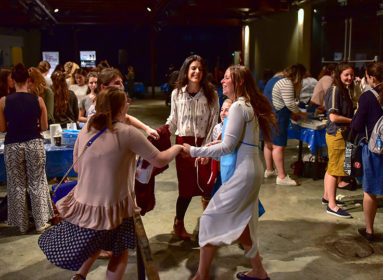
The (unlikely) story of a Connecticut-born rabbi and a New York ex-con
By Cindy Mindell
WEST HARTFORD – The story of Louis “Big Lou” Ferrante is among the more remarkable in the chronicles of Jews-by-choice. A mobster sentenced to life in federal prison at age 25, Ferrante was released after just eight-and-a-half years, committed to formalizing the observant Jewish lifestyle he had discovered in prison.
What is less known is that the rabbi who helped Ferrante through his conversion process is Hartford native Arthur D. Rulnick.
Later this month, rabbi and student will share the stage for the first time, telling the story “From Mobster to Mensch” at the Jewish Historical Society of Greater Hartford’s 45th anniversary gala.
Born in Queens, N.Y., Ferrante spent his teen years hijacking delivery trucks, driving them to drop-offs all over New York, and reselling the merchandise. His activities earned him the attention of Mob Boss John Gotti, head of the Gambino crime family, but he was eventually indicted by federal and New York authorities. While spending a reduced sentence of close to nine years in federal penitentiaries for armed robbery, Ferrante read his first book and became an avid reader, studying history, philosophy, and literature, and writing Aleesa, a historical novel set in the antebellum South.
Eventually, he turned his attention to world religions, reading the New Testament and the Quran and attending Christian and Muslim religious services before studying the Torah and going to Jewish services. By the time he was released in 2003, he had decided to convert to Judaism. He was introduced by his stepsister to Rabbi Arthur D. Rulnick, who would oversee his conversion process.
Rulnick was born and raised in Hartford and West Hartford, the son of the late Morris and Sara Rulnick and the brother and brother-in-law of Marshall and Sandra Rulnick of Bloomfield. Rulnick grew up as a member of Beth El Temple in West Hartford, where he met his future wife, Adrienne, and where Rabbi Stanley Kessler advised him to enter the rabbinate.
“Rabbi Kessler was a great influence on my life,” Rulnick says. “Since he told me that I should become a rabbi, I did.”
After graduating from the Hall High School, Rulnick enrolled in the Columbia University-Jewish Theological Seminary (JTS) joint program and spent “a very influential year” as a junior at the Hebrew University of Jerusalem. He then attended JTS, where he was ordained in 1969.
That year was one of two “years of service” in the Conservative movement, when JTS rabbinic graduates had to either serve as military chaplains during the Vietnam War or spend two years at a “service pulpit,” a Conservative synagogue that had difficulty acquiring a rabbi. With a history of opposition to the war, Rulnick chose the latter option, leading Shearith Israel Synagogue in Columbus, Ga. for five years. “It was a great place for a rabbi to start out, in a warm Southern Jewish community,” he says.
Rulnick and his family then moved to Pittsfield, Mass., where he served as rabbi of Congregation Knesset Israel, and spent the last 17 years of his rabbinical career at the Woodbury Jewish Center on Long Island.
That was where he first learned about Louis Ferrante from a congregant, whose (Jewish) mother had married Ferrante’s (Catholic) widowed father.
“My congregant came to me and said, ‘I have a step-brother who is getting out of prison and he wants to convert to Judaism. Would you convert him?’” Rulnick recalls. “I said, ‘I don’t know. I’ll have to meet him.’ In the back of my mind, I was thinking that I’ve met people in jail who say they want to become rich, so they want to become Jewish. Certainly a lot of African-Americans become Muslim in jail – it’s a place of conversionary experience. I said, ‘Let me see.’”
Ferrante completed his prison sentence and came to meet Rulnick.
“He looked like a thug and he talked like a thug, but I started asking him questions and there was nothing about Jewish history he didn’t know, there was nothing about bible he didn’t know,” Rulnick says. “He knew the prayers, he read the bible all the time, he was writing commentary on the bible. He knew about everything else – American history, European history, philosophy, poetry. It was unbelievable. Normally, when you convert someone, you have to teach them. There was nothing I could find that I could really teach him, so we used to discuss Jewish holidays, prayers, theology, bible, but I wasn’t teaching him; we were discussing things that he already knew and had a handle on.”
One day, Ferrante told Rulnick that he wanted to buy tefillin, and the rabbi suggested the Judaica store in Queens where he had bought his latest pair of tefillin.
“Lou comes back and he says, ‘Rabbi, you won’t believe this: it’s a sign. The place you sent me is two blocks from where I pulled my first hijacking,’” Rulnick says. “That symbolized the full circle that he made from hijacking trucks and selling the contents to becoming a religious Jew.” Ferrante completed his conversion process in 2004.
Ferrante recounts his experiences in Unlocked: The Life and Crimes of a Mafia Insider (Harper, 2008) and Mob Rules: What the Mafia Can Teach the Legitimate Businessman (Portfolio, 2011). In 2009, he received the Celebrity Reading Hero Award from Sarah Brown, wife of then-British Prime Minister Gordon Brown, for his work with at-risk youth. He is an award-nominated TV host and producer who wrote, hosted, narrated, and co-produced Inside the Gangsters’ Code, which aired on the Discovery Channel in more than 195 countries and in multiple languages.
“From Mobster to Mensch:” Jewish Historical Society of Greater Hartford’s 45th Anniversary Gala with Special Guests Louis Ferrante and Rabbi Arthur D. Rulnick: Sunday, Oct. 30, 6 PM, The Emanuel Synagogue, 160 Mohegan Drive, West Hartford. For tickets and information: jhsgh.org/anniversarygala.html / (860) 727-6170.
CAP: Rabbi Arthur D. Rulnick








 Southern New England Jewish Ledger
Southern New England Jewish Ledger










